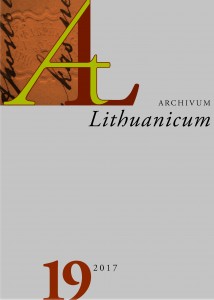MAŽVYDAS IR AUGUSTINAS: IMK(IT) IR SKAITYK(IT)
MAŽVYDAS AND AUGUSTINE: TAKE (ME) UP AND READ
Author(s): Jurgis PakerysSubject(s): Theoretical Linguistics, Lithuanian Literature, 16th Century, Theory of Literature
Published by: Lietuvių Kalbos Institutas
Summary/Abstract: The opening line in the preface of the first Lithuanian book prepared by Martynas Mažvydas (1547) reads imkiet mani ir ſkaitikiet (lit.) ‘take me and read’ and I suggest that this phrase may reflect the famous divine words heard by Saint Augustine: tolle lege, tolle lege ‘take up—read, take up—read’ (Confessiones VIII , 12, 29). Both phrases match with respect to the verbs, their order, and the mood, but the Lithuanian phrase is not repeated. It has two additional words (mani ‘me’, and ir ‘and’) and the verbal forms appear in the second-person plural. One should note that Lithuanian here is similar to many other languages where this phrase has become popular without the repetition and with the conjunction, cf. English take up and read, German nimm und lies, French prends et lis, Italian prendi e leggi, Polish bierz i czytaj, etc. The phrase of Mažvydas is different, however, in that it is used for the personification: the voice of the preface is attributed to the book and this is the reason why the pronominal form mani ‘me’ (accusative) was added; this rhetorical device is also known from some other sixteenth-century books. The added pronoun points to the most important part of the book, the catechism; the included hymns are referred to only once and a short primer, which appears after the preface, is never mentioned. The verbal forms are in second-person plural because the addressee of Mažvydas are plural, the brothers and sisters (BRalei ſeſeris). It is well known that Augustine was one of the most widely published and studied authors in the sixteenth century, a figure of high importance to the Reformation movement, and there are no doubts that Mažvydas was familiar with his works.
Journal: Archivum Lithuanicum
- Issue Year: 2017
- Issue No: 19
- Page Range: 39-56
- Page Count: 18
- Language: Lithuanian

